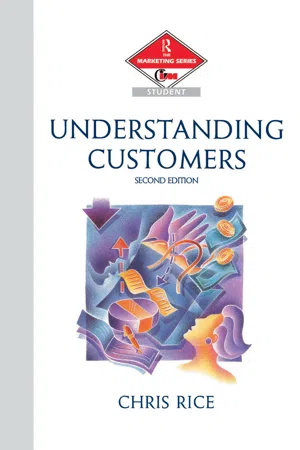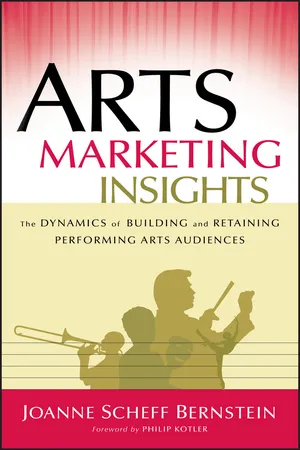Research Instrument
A research instrument in marketing refers to the tools or techniques used to collect data for analysis. This can include surveys, questionnaires, interviews, and observation methods. The choice of research instrument depends on the specific research objectives and the type of data needed to make informed marketing decisions.
5 Key excerpts on "Research Instrument"
- eBook - ePub
- Chris Rice(Author)
- 2010(Publication Date)
- Routledge(Publisher)
...It has been defined by the Market Research Society as: The collection and analysis of data from a sample of individuals or organizations related to their characteristics, behaviour, attitudes, opinions or possessions. It includes all forms of research such as consumer and industrial surveys, psychological investigations, observational and panel studies … What can market research do? The process of marketing research is used by organizations for a number of purposes: • To identify changes in the existing marketplace • To improve market awareness so as to inform negotiations with suppliers • To build up a bank of information • To solve ad hoc problems • To help in making plans for the future • To monitor the success of current plans. We could illustrate this by posing some of the questions which a marketing department may be asked to answer. Some may centre on the existing market, e.g.: • How big is a given market? • Is it growing, contracting or stable? • How profitable is it? • What differing market segments are apparent? • How are they different from one another? • What other products/services are in the market? • Who are the significant players/competitors? Others focus on potential markets : • How can we get ideas for new products/services? • How do we choose which ideas to develop? • How do we identify new market segments to target? Strategic questions may be asked: • Where do we stand in the market compared with our competitors? • Should we get out of a given...
- Callie Daum, Vibrant Publishers(Authors)
- 2020(Publication Date)
- Vibrant Publishers(Publisher)
...The first instrument is the questionnaire and is the most commonly used. It is a group of questions that is distributed to people in the sample for their responses. Flexibility is a major advantage of questionnaires because you can ask a question a multitude of ways. The downside is that sometimes questions that should be asked are left out or include questions that are not really needed or obtainable. When developing questionnaires, it is important to understand the form of the question, so you can get the type of response you are looking for. If you ask an open-ended question, respondents can write freely their answers without any specific set of prescribed answers. Close ended questions give the respondent all of the possible answers and asks the respondent to choose from the preset answers. Questions should be carefully constructed so not to create bias amongst respondents. They should be easy for anyone to read. The questions should generate interest, so respondents are incented to continue filling out the questionnaire. The other type of instrument is a mechanical instrument. Examples of mechanical instruments may be people meters, pupilometer, or super market scanners. All of these instruments have an automated way to survey respondent interests. People meters are commonly distributed by Nielsen and are attached to TVs to monitor what people are watching. Pupilometers measure eye movements to understand a person’s interest based on certain stimuli. Super market scanners track what people are buying. Present the Plan After gathering all of the items above, the information should be arranged into a written proposal. There are many elements to a research plan so writing out the proposal helps management get the big picture. The plan should include what the problem is, the objectives, the data included, the sources and methods for the information, and recommendations...
- eBook - ePub
- Robert E Stevens, David L Loudon, Morris E Ruddick, Bruce Wrenn, Philip K Sherwood(Authors)
- 2012(Publication Date)
- Routledge(Publisher)
...When the adjective marketing is added to research, the context of the area of inquiry is defined. Marketing research, then, refers to procedures and techniques involved in the design, data collection, analysis, and presentation of information used in making marketing decisions. More succinctly, marketing research produces the information managers need to make marketing decisions. Although many of the procedures used to conduct marketing research can also be used to conduct other types of research, marketing decisions require approaches that fit the decision-making environment to which they are being applied. Marketing research can make its greatest contribution to management when the researcher understands the environment, industry, company, management goals and styles, and decision processes that give rise to the need for information. MARKETING RESEARCH AND DECISION MAKING Although conducting the activities of marketing research requires using a variety of research techniques, the focus of the research should not be on the techniques. Marketing research should focus on decisions to be made rather than the collection techniques used to gather information to facilitate decision making. This focus is central to understanding the marketing research function in terms of what it should be and to the effective and efficient use of research as an aid to decision making. Any user or provider of marketing research who loses sight of this central focus is likely to end up in one of two awkward and costly positions: (1) failing to collect the information actually needed to make a decision, or (2) collecting information that is not needed in a given decision-making context. The result of the first is ineffectiveness—not reaching a desired objective, and the result of the second is inefficiency—failing to reach an objective in the least costly manner...
- eBook - ePub
The Handbook for Market Research for Life Sciences Companies
Finding the Answers You Need to Understand Your Market
- Jean-Francois Denault(Author)
- 2017(Publication Date)
- Productivity Press(Publisher)
...Test your interview guide with a few potential participants: you might find that some questions are redundant, that some questions are missing, and that some questions are misunderstood by your target audience. It is much more cost-effective to find this out at this stage rather than at the data analysis stage. The two main types of tools a researcher can prepare when doing market research are questionnaires and a research guide (which includes variants such as discussion and observation guides). A questionnaire is a list of questions that a researcher prepares to collect data from a statistically significant number of subjects. It is mostly used in surveys (online or in person), telephone, and mailing interviews. Most of the time, the market researcher will not be administrating the survey as it will be done by a third party (such as an online web tool, or a paid resource). As such, the researcher has to make sure that the questions are sufficiently clear, that misinterpretations are unlikely, and that the collection is standardized across multiple interviewers. As for the discussion guide, it is mostly used in focus groups and in-depth interviews, and includes mainly open-ended question that guide the conversation. More information on building these tools is available in Chapter 4. 1.2.2.3 Collecting Data This is the moment when you go down to the trenches and put your plan into action. You start recruiting and doing interviews, you send out your survey, or you start searching the Internet for the information you need. This could be done by you, or you might hire a firm to do some (or all) of the data collection...
- eBook - ePub
Arts Marketing Insights
The Dynamics of Building and Retaining Performing Arts Audiences
- Joanne Scheff Bernstein(Author)
- 2011(Publication Date)
- Jossey-Bass(Publisher)
...CHAPTER 7 Conducting and Using Marketing Research What we call results are beginnings. —Ralph Waldo Emerson R ESEARCH IS THE STARTING POINT FOR MARKETING. Marketing research plays a critical role in understanding customer attitudes and behavior and in planning marketing strategy. As important as research has always been, the need for marketing research information is greater now than at any time in the past. As consumers have become more selective and demanding in their purchasing behavior, marketers find it more difficult to predict people’s responses to different features, benefits, packaging options, information sources, ticket purchase outlets, pricing, and other attributes unless they turn to marketing research. Also, as market segments become smaller and as marketers attempt to reach out to new segments, organizations need to learn more about the needs and wants of all these varied target markets. Market research also empowers marketers to effectively improve their customer service strategies. There is concern among some managers and artistic directors that audience research will compromise the artistic mission and integrity of the organization. But it is up to the organization to determine how the information gleaned from the research will be used, so these directors are missing an opportunity to use market research information to their advantage. BUDGETING FOR MARKET RESEARCH Although research provides a critical resource, information, marketing managers have limited budgets and assign higher priority to other expenditures. Marketers are also constrained because their knowledge of the correct use of marketing research and its technical aspects is typically limited. Furthermore, marketers are often discouraged from conducting research by the arts organization’s top-level managers and board members who do not adequately understand the uses and value of marketing research. However, marketing research need not be expensive...




